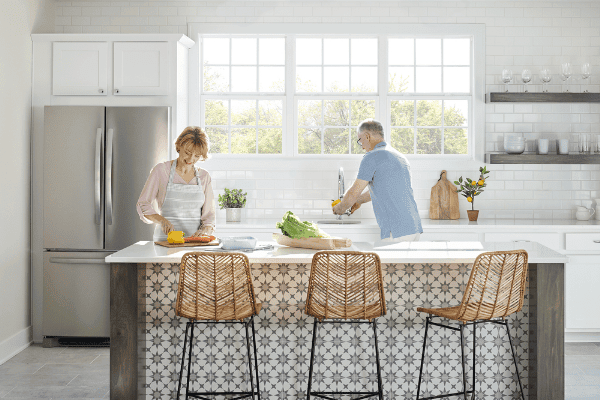Real Estate Red Flags: What to Look Out for When Buying a House
Posted
on July 20, 2023

Energy efficiency in general is a common concern. Increasingly, homeowners seek to understand why some models are more energy efficient than others and narrow down to determine which windows are the most energy efficient.
For some homeowners, the desire to reduce their energy footprint drives most of their home feature decisions, and for others, a combination of interest in greener technology and the ability to save money on utilities over time is the main draw toward investing in energy efficient materials for the home. But when it comes to two of the most popular window types with similar functionality and a wide range of stylistic uses, which is more energy efficient, single-hung or double-hung windows? Let’s take a closer look.

The Difference Between Single-Hung and Double-Hung Windows
Before we can really answer the question of higher energy efficiency, it’s important to understand the design differences between a single hung window and a double hung window. As two of the most common windows in residential homes today, they both offer desired functionality and a wide range of size options that make them incredibly versatile workhorses on homes of all architectural types. But here’s where they differ.

Single-Hung Window: Main Features
A single-hung window consists of two panels (or sashes). This two-panel construction is necessary to allow the window’s functionality, however, single-hung windows feature only one operable panel. In a single-hung window, only the lower panel moves up and down. This functional panel allows homeowners to control the airflow and ventilation in the home, but with some limitations on the amount due to the single-sash operation.
Double-Hung Window: Main Features
Similar in construction, double-hung windows are also created with two panels (or sashes.) However, a double-hung window features two operable panels instead of single-hung windows’ singular operable panel. Double-hung windows can be raised from the lower panel or lowered from the upper panel to allow for greater control over airflow and ventilation. This superior operability has earned double-hung windows the title of most popular window style in American homes. Double-hung window sashes also tilt in to make cleaning your windows easier than ever.

Energy Efficiency Factors in Windows
Now that we better understand the differences between these two window types, it’s time to tackle energy efficiency. What contributes to how energy efficient a window is? Here are a few key factors:
- Construction. How a window is constructed contributes to the overall efficiency of the window. Where some windows offer enhanced operating features, they may also experience greater risk of air leakage, making them less energy efficient than their less-operable counterparts.
- Materials. Window frame material, glass coatings, and more impact your window’s energy efficiency as well. In the single-hung vs. double-hung window debate, this is less of a factor as the homeowner can choose similar materials and coatings for either window type.
- Installation. Perhaps the most impactful factor in how energy efficient your single- or double-hung window is will come down to how it was installed. That’s why working with professional installers is so important. Without proper installation, air leakage, improper sealing, diminished lifespan, and increased rate of wear and tear can all take a quick toll on your window’s energy efficiency as well as the comfort in your home.
- Energy Efficiency Ratings. A combination of construction, materials, and other window technology features determine whether or not a window is eligible to receive ratings such as ENERGY STAR® and National Fenestration Rating Council (NFRC) ratings. While these ratings don’t tell the whole story, they are an excellent place for homeowners to narrow down their window options and can help guide decisions early in the research process.

Double Hung vs. Single Hung Windows
We’ve looked at the differences between the two window types and considered the factors that may contribute to how energy efficient the windows really are. Now let’s dig into it: which is more energy efficient — single-hung or double-hung windows?
In reality, they are similarly efficient. Because the bulk of efficiency relies on glass selection (Low-E coating, double and triple pane selection, etc), material choice, and window installation, efficiency of either window type is largely in the hands of the homeowner.
However, when we look at the construction and operability of both window types, single-hung comes out on top for energy efficiency. Why? Single-hung windows feature only one operable panel as opposed to double-hung’s two, which means that by way of their functionality, double-hung windows have a greater risk of air leakage. It’s a slight advantage, but for homeowners looking to answer the question of which is more efficient as they decide which replacement windows will work well for their home, single-hung windows come out on top.
Get Energy Efficient Windows You’ll Love With the Experts at Pella
At the end of the day, choosing the right energy efficient windows for your home is about balancing all the factors that matter most to you and working with the professionals who can help you find the products and designs that meet at the optimal crossroads of your needs and wants. That’s why the experts at Pella are here.
Schedule a consultation to discuss the benefits of single-hung vs. double-hung windows, energy efficiency in your homes, and how we can help maximize your investment with long-lasting, beautiful windows and doors that offer you functionality and long-term energy savings.
Schedule a free consultation to find windows and doors for your home.
